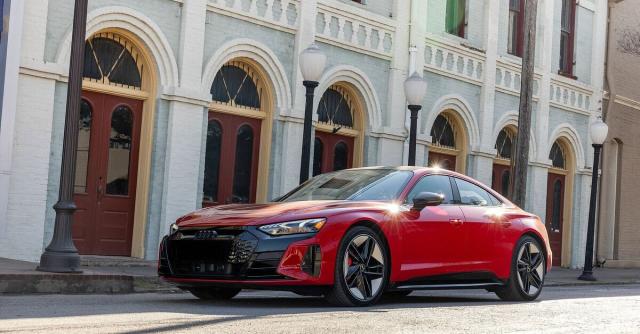Audi’s all-electric e-tron subbrand continues suffering from Battery issues, with the company recently issuing a recall for the GT sedan and its zestier RS variant. The issue is that the high-voltage batteries equipped to the models might short circuit, posing a fire risk to owners and whatever they’ve parked their EV next to. The recall report stipulates that Porsche warned Audi of the possibility of “thermal events” after realizing that some Taycan models were suffering from battery defects.
The two models are mechanically similar and have identical battery modules, so Audi and its supplier (LG Energy Solution Wrocław) were effectively obligated to look into the matter. The companies are now recommending that owners only charge the vehicles up to 80 percent capacity to help mitigate fire risks.
Recalls have been on the rise generally in recent years with system integration issues outpacing faulty parts. As the industry continues pivoting toward “software defined vehicles,” we’ve seen an uptick in recalls and complaints pertaining to electrical issues. However, there’s often a fair bit of overlap now that so many vehicle components have been turned into drive-by-wire units or have to be networked together.
This has also resulted in battery issues due to the fact that an electric vehicle's state of charge and how it regulates charging is handled by the computer. In the past, we’ve seen automakers tweak an EV’s code via over-the-air updates to expand its range or mitigate charging when there’s a problem. While the practice opens a gigantic can of worms in regard to who actually is in control of the second most expensive thing you’ve ever bought, it likewise showcases just how much damage some bad software can do to modern automobiles.
Porsche and Audi seem to be suffering from both mechanical and software defects and opted to split their recalls into two groups. The first group doesn’t have a solution, hence the company suggesting customers don’t fully charge their vehicles as a safety precaution. It is supposed to affect an extremely small number of the total involved in the recall. For Audi, that was said to be about 1 percent of 1,013 units.
The other issue only impacts a couple dozen vehicles. But it was said to require a battery replacement in all instances due to assumption that they’re suffering from a mechanical defect. These cars were singled out after the company parsed through the battery data that’s transmitted from the vehicle back to the manufacturer.
Our guess is that Volkswagen Group doesn’t want to install any more batteries than it absolutely has to and is just trying to limit repairs to a software update on as many Porsche and Audi models as possible. The symptoms of both recalls are so similar that it seems unlikely that they’re not closely related. If we were to speculate, there’s a chance that the vehicles getting new batteries are simply too large of a risk to try and solve with a software flash.
At any rate, the companies involved have said they will continue to study telematics data to determine whether or not batteries will need to be replaced. Customers that do have to have work done in relation to this will be able to bring it in for repairs free of charge under the recall.
All impacted models appear to stem from the 2022-2023 model years with the defect appearing quite similar to the e-tron SUV recall from December. In that recall, the EVs were likewise using batteries manufactured by LG Energy Solution and were similarly at risk of thermal runaway. Even the solution was exactly the same. Audi planned on implementing a software update that more closely monitored the battery system and would advise drivers not to charge their vehicle beyond 80 percent if something appeared off.
Sadly, the company didn’t think it would have a comprehensive solution in place until fall of 2024 — which does not bode well for the recently recalled Porsche Taycan and Audi e-tron GT.
[Image: Audi]
Become a TTAC insider. Get the latest news, features, TTAC takes, and everything else that gets to the truth about cars first by subscribing to our newsletter.
This post first appeared on New Car Reviews, Ratings & Pricing, Auto News For New Models, please read the originial post: here

